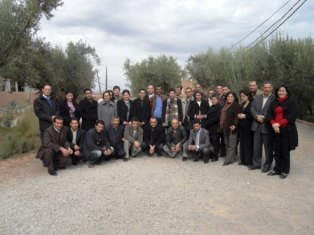TRAINING SESSION: CCDH REGIONAL OFFICIALS AND LOCAL STAKEHOLDERS REFLECT ON INTERNATIONAL HUMAN RIGHTS INSTRUMENTS
Forty participants attended the training session provided by Mr. El Haiba, CCDH Secretary General.
The Advisory Council on Human Rights (CCDH) organized on 25 - 26 November 2010 a training session for its regional executives and local stakeholders on the international human rights instruments and mechanisms for their implementation.
This training program, in which took part some forty regional administrative officials and representatives of partner organizations, was provided by Mr. Mahjoub El Haiba, CCDH Secretary General, University Professor and member of the UN Human Rights Committee. The overall objective of this session, as noted by Mr. El Haiba at the opening session, was to enable the participants to grasp the universal character of international human rights instruments and mechanisms for their implementation.
This session, said Mr. El Haiba, specifically aimed to help officials of the regional offices to implement the universal standards of human rights in their activities, including investigation, treatment of complaints and orientation of victims of violations and draw upon this reference in debates organized by the regional offices within the framework of the promotion of human rights culture.
In this context, Mr. El Haiba indicated that the provisions of international conventions ratified by Morocco, which are reference in the field of human rights, must be adopted by national institutions in their fields of activity. He noted that Morocco has ratified eight of the nine most important international conventions. These 9 conventions have mechanisms in charge of their monitoring and implementation which have had significant results in relation to the treaty practices of Morocco, national legislation and harmonization of legislation with the provisions of those conventions, despite the limits and efforts of State institutions.
The participants were able to strengthen their knowledge in the field of international human rights instruments and mechanisms for their monitoring and implementation. The definition of human rights, as universally recognized, human rights applications, the UN system of human rights protection (the UN General Assembly, the Economic and Social Council, the Human Rights Committee, the transformation of the Human Rights Committee to the Human Rights Council), were the main points around which evolved the training.
Mr. El Haiba focused on the Universal Periodic Review (UPR) and highlighted that it is a process conducted under the auspices of the Human Rights Council. It involves a review of the human rights records of UN member States once every four years. He shed light then on treaty bodies, committees that are in charge of the monitoring and implementation of the provisions of the conventions in subscribed countries and that review periodic reports submitted by States parties.
Mr. El Haiba shed light on the case of Morocco and focused on the conventions and their optional protocols it has ratified and those that it has not yet ratified. He highlighted the case of the Committee on the Elimination of Racial Discrimination (CERD), through a reading of the 17th and 18th periodic reports submitted by Morocco on 30 October 2009.
As noted by CCDH Secretary General, this training program is a pilot program that will be open subsequently to other CCDH departments, partners, civil society stakeholders and State institutions, including the parliament and the Ministry of Justice, within the framework of the capacity building of stakeholders concerned by the follow up of the implementation of the recommendations of treaty bodies.
Within the framework of this training program, specific training workshops will be organized, later, on categories of rights as covered by international conventions (children, women, persons with disabilities, refugees, etc.) or themes (racial discrimination, torture, trafficking in persons, etc.).






















